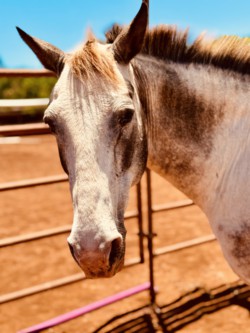The Healing Power of Horses
 By Léo Azambuja
By Léo Azambuja
A nonprofit organization based on Molokai is saying they have delivered positive results after a few months of offering free equine-assisted therapy sessions to families and individuals on the island.
“We have noticed a huge benefit, we are watching folks progress throughout their time with us,” Ho‘aka Mana executive director Kanoe Davis said.
The Pili Na Lio equine therapy program started in February, in collaboration with Maui’s Spirit Horse Ranch. The program is grant-funded until the end of the year, but Davis said it is working so well, that Ho‘aka Mana is hoping to extend it until the end of 2026.
Generally, equine therapy is when therapists treating mental health conditions or physical disabilities utilize horses to promote healing. This can be in the form of grooming the horses, riding them or interacting with them through a series of activities, always under the guidance of professionals.
Pili Na Lio hasn’t offered rides yet. For now, they promote different forms of interaction with three Hawaiian ponies, Kilo, Kegel and Pepper.
A team from Maui’s Spirit Horse Ranch comes every month to Molokai for a full day of sessions. Here, they are joined by on-island trained staff. The sessions are held on a property owned by Viola and Weldon Wichman in Ho‘olehua.
Despite each horse weighing a few hundred pounds, their gentle connection with people has reduced anxiety, broken down communication barriers and improved self-awareness.
“Horses are able to pick up on trauma, they can pick up an anxiety, they can pick up on emotions,” said Davis, adding the horses will absorb those feelings from humans, and do things such as chew hair, yawn or lay on the ground and roll over.
“What they are doing is they are assessing whatever trauma, anxiety, emotions that you are going through, and they are pulling, they are leeching it out of you so that you can realign, be more coherent, and stay grounded,” she said.
Ho‘aka Mana ‘ulu, or crisis counselor, U‘ilani Miner-Ching said the horses are trained to heal and to be around people, and the trainers are there to guide the sessions.
“It is a very safe space. I felt very safe there, even though I have never experienced being around free, unbridled horses,” Miner-Ching said.
Before the sessions start, the staff asks a series of questions to gage the level of comfort people have around horses, Davis said. If they are timid around horses, the staff takes extra care to train them on what to look for around horses, making sure they know where they stand and how to respect the horses.
Davis said they keep evaluating everyone as the sessions progress. Slowly, they make their way to connecting with the horses, especially the young kids.
“On Tuesday, a four-year-old was able to walk with the trainer and the horse. That is a huge progress, because they are starting to build their confidence, and they are starting to build that pili (close relationship) with the horse,” she said.
There are multiple layers and goals associated with the program, according to Davis.
“It is truly strengthening the person to find themselves again. Because a lot of the times, the folks that do come to these programs, they are searching, really, for themselves,” she said, adding every time they return, they build trust with the trainers and horses. “It is easy for them to just talk now, and that is the beautiful thing.”
If people feel they need more counseling as an individual to release whatever they are holding on to, Miner-Ching is available in the weeks between sessions.
“If you need extra help, we offer that service,” Davis said.
The sessions are on the first Friday of each month, from 10 a.m. to 4 p.m. (they used to be on the first Tuesday).
“We have multiple slots throughout the day,” Davis said. “You can bring families, you can bring an individual, and it can be groups.”
The sessions usually lasting about an hour. Reservations are required to book a slot. Everything is confidential.
“We still treat it with a lot of respect for our community, making sure that their privacy is tenderly taken care of,” Davis said.
Visit www.hoakamana.org for more information or to book a session.











Don't have a Molokai Dispatch ID?
Sign up is easy. Sign up now
You must login to post a comment.
Lost Password